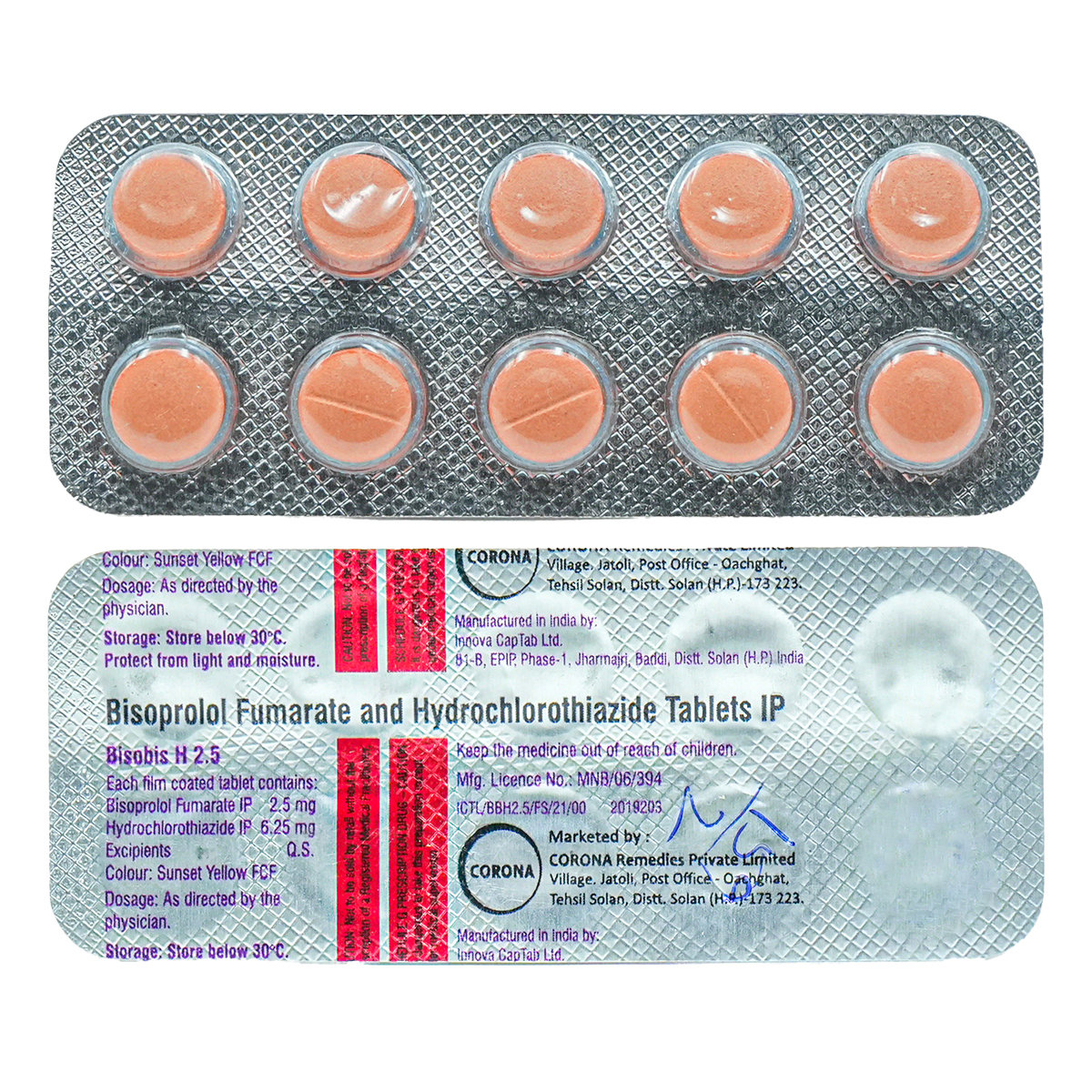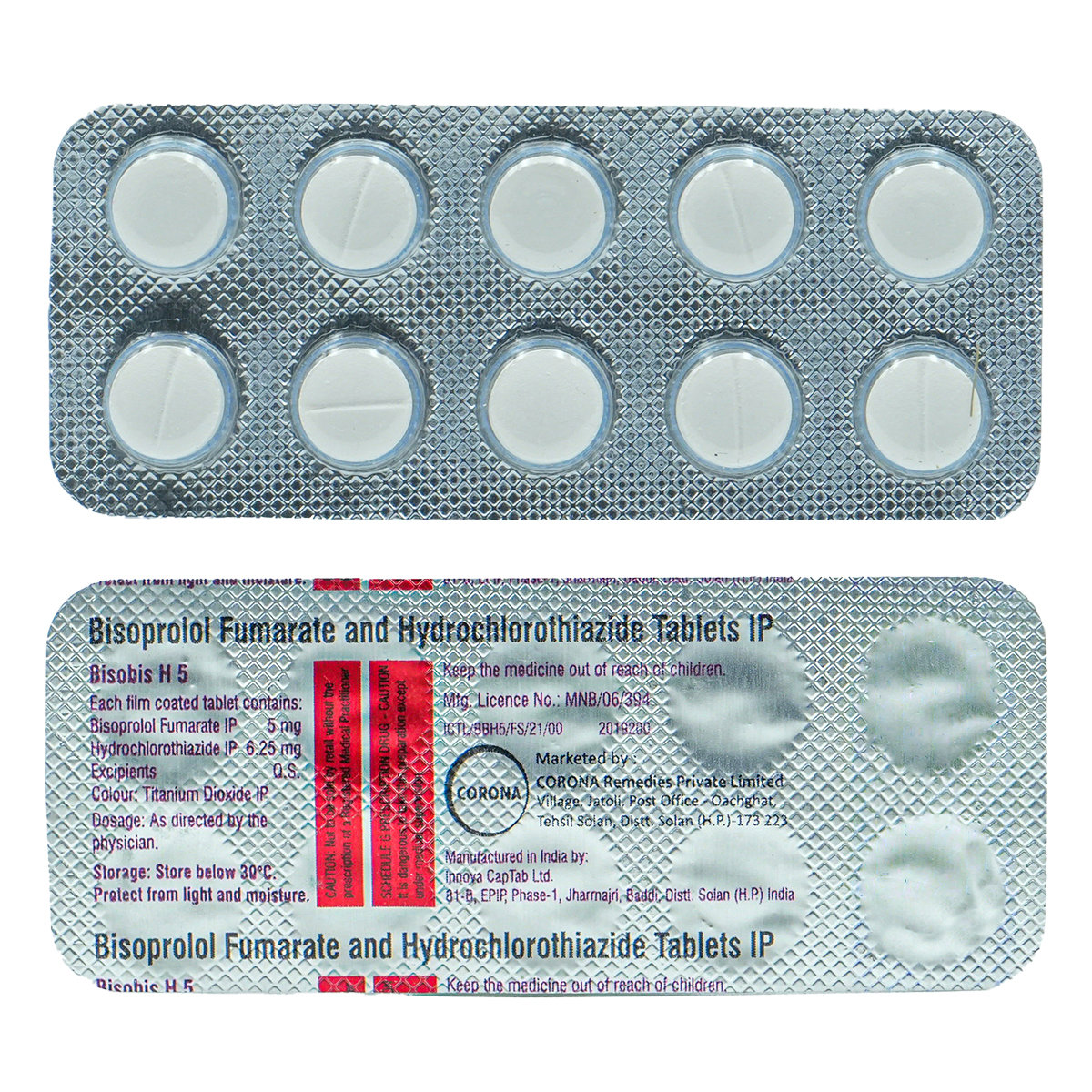Bisoprolol+hydrochlorothiazide
About Bisoprolol+hydrochlorothiazide
Bisoprolol+hydrochlorothiazide is a combination of blood pressure-lowering medicine, primarily used to treat high blood pressure. Bisoprolol+hydrochlorothiazide contains bisoprolol (beta-blockers) and Hydrochlorothiazide (diuretics or water pills) which collectively lower blood pressure. Hypertension or high blood pressure is a chronic condition in which the force exerted by the blood against the artery wall is high. As a result, it leads to heart disease, irregular heartbeat, and other complications.
Bisoprolol+hydrochlorothiazide contains Bisoprolol and Hydrochlorothiazide. Bisoprolol (beta-blocker) helps in relaxing our blood vessels by blocking the action of certain natural substances in your body. This lowers your blood pressure and helps in reducing your risk of having a stroke, a heart attack, other heart problems, or kidney problems in the future. This medicine needs to be taken regularly to be effective. Hydrochlorothiazide (diuretic) works by increasing the amount of urine passed out from the kidneys. It effectively reduces excess fluid overload in the body and treats edema (swelling) associated with heart, liver, kidney, or lung disease. This reduces the heart's workload and makes the heart more efficient at pumping blood throughout the body. Thus, collectively, both help lower high blood pressure, reducing heart attack, or stroke chances.
Take Bisoprolol+hydrochlorothiazide as prescribed by your doctor. You are advised to take Bisoprolol+hydrochlorothiazide for as long as your doctor has prescribed it for you depending on your medical conditions. You may experience nausea, fatigue (tiredness), constipation, diarrhea, headache, dizziness, drowsiness, cough and slow heart rate. Most of these side effects of Bisoprolol+hydrochlorothiazide do not require medical attention and gradually resolve over time. However, if the side effects are persistent, reach out to your doctor.
Before starting Bisoprolol+hydrochlorothiazide, please inform your doctor if you have an allergy, heart disease, unable to pass urine, asthma, diabetes, thyroid, glaucoma (increased pressure on the eye cause vision loss), kidney and liver disease, and gout (severe pain and redness in joints). Immediately tell your doctor if you are pregnant or breastfeeding.
Uses of Bisoprolol+hydrochlorothiazide
Medicinal Benefits
Bisoprolol+hydrochlorothiazide contains bisoprolol (beta-blockers) and Hydrochlorothiazide (diuretics or water pills) which collectively lower blood pressure. Bisoprolol helps in relaxing our blood vessels by blocking the action of certain natural substances in your body. This lowers your blood pressure and helps in reducing your risk of having a stroke, a heart attack, other heart problems, or kidney problems in the future. Hydrochlorothiazide works by increasing the amount of urine passed out from the kidneys. It effectively reduces excess fluid overload in the body and treats edema (swelling) associated with heart, liver, kidney, or lung disease. Thus, collectively, both help in lowering high blood pressure.
Directions for Use
Storage
Side Effects of Bisoprolol+hydrochlorothiazide
- Nausea
- Fatigue (tiredness)
- Constipation
- Diarrhea
- Headache
- Dizziness
- Drowsiness
- Cough
- Slow heart rate
Drug Warnings
Before starting Bisoprolol+hydrochlorothiazide, please inform your doctor if you have an allergy, heart disease, unable to pass urine, asthma, diabetes, thyroid, glaucoma (increase pressure of eye cause vision loss), kidney and liver disease, or problems with circulation (Raynaud’s syndrome), and gout (severe pain and redness in joints). Immediately tell your doctor if you are pregnant or breastfeeding. Do not stop this Bisoprolol+hydrochlorothiazide suddenly because it worsens the condition. Before having surgery or dental procedure that you are taking this Bisoprolol+hydrochlorothiazide.
Drug Interactions
Drug-Drug Interaction: Bisoprolol+hydrochlorothiazide may interact with alpha-blockers (prazosin, terazosin), drugs for high blood pressure (clonidine), pain killers (aspirin), and drugs for high cholesterol (rosuvastatin).
Drug-Food Interaction: You are recommended not to consume alcohol along with Bisoprolol+hydrochlorothiazide to avoid unpleasant side effects.
Drug-Disease Interaction: Bisoprolol+hydrochlorothiazide should not be given to people with diabetes, thyroid disease, asthma, cardiogenic shock (when the heart fails to pump required blood to the body), heart valve problem (stenosis), low blood pressure (hypotension), coronary heart disease, liver disease or heart failure, low serum potassium (hypokalemia), patients with nil urine output (anuria), etc.
Drug-Drug Interactions Checker List:
Safety Advice

Alcohol
unsafeYou are recommended not to consume alcohol along with Bisoprolol+hydrochlorothiazide to avoid unpleasant side-effects.

Pregnancy
cautionIt is not known whether this Bisoprolol+hydrochlorothiazide will harm an unborn baby. Inform your doctor if you are pregnant or plan to become pregnant.

Breast Feeding
cautionBisoprolol+hydrochlorothiazide can pass into breast milk and may harm to new-born babies. You should not breast-feed while using this Bisoprolol+hydrochlorothiazide.

Driving
unsafeIt is not recommended to drive after taking Bisoprolol+hydrochlorothiazide as it may occasionally cause drowsiness or fatigue.

Liver
cautionBisoprolol+hydrochlorothiazide to be taken with caution, especially if you have a history of liver diseases/conditions. Your doctor may adjust your dose depending upon your current liver conditions.

Kidney
cautionBisoprolol+hydrochlorothiazide to be taken with caution, especially if you have a history of Kidney diseases/conditions. Your doctor may adjust your dose depending upon your current kidney conditions.

Children
unsafeBisoprolol+hydrochlorothiazide is not recommended for children below 18 years. So, it is not safe for children.
Habit Forming
Diet & Lifestyle Advise
- Keep your weight under control with BMI (Body Mass Index) 19.5-24.9.
- Do regular physical activity or exercise for at least 150 minutes per week, or about 30 minutes most days of the week. Doing this can help you to lower your raised blood pressure by about 5 mm of Hg.
- Opt for a diet rich in whole grains, fruits, veggies, and low-fat dairy products.
- If you are taking alcohol then only one serving for women and two servings for men is advisable.
- Quitting smoking is the best strategy to lower the risk of heart disease.
- Avoid chronic stress as it can raise your blood pressure. Try to enjoy and spent time with your loved ones to cope with stress and practice mindfulness techniques.
- Monitor your blood pressure daily and if there is too much fluctuation then immediately contact your doctor.
- Try to include heart-healthy omega 3 fatty acids containing food drinks in your daily diet. You can also use low-fat cooking oil like olive oil, soybean oil, canola oil, and coconut oil can help in lowering your elevated blood pressure.
Special Advise
Limit intake of sodium chloride (table salt) in your daily diet to 2300 mg per day or less than 1500 mg is ideal for most adults.
Patients Concern
Disease/Condition Glossary
Hypertension: It is a chronic condition when blood pressure is too high. This condition can lead to hardened arteries (blood vessels), decreasing the blood and oxygen flow to the heart. Blood pressure is the measurement of the force that our heart uses to pump blood to all parts of the body. Raised blood pressure can cause chest pain (angina) and heart attack (when blood supply to the heart is blocked). Additionally, high blood pressure also causes brain damage (stroke) and kidney failure. High blood pressure can be diagnosed with the help of a blood pressure monitor or sphygmomanometer. Systolic pressure is the pressure when the heart pumps blood out. On the other hand, diastolic pressure is the pressure when your heart is at the resting stage between heartbeats. If your blood pressure is 140/90 mm of Hg, it means the systolic pressure is 140 mm of Hg and, diastolic pressure is 90 mm of Hg. Ideal blood pressure should be between 90/60 mm of Hg and 120/80 mm of Hg.
FAQs
It is advised to continue your medicine even after your blood pressure is under control or becomes normal as blood pressure can shot up at any time. If you have any discomfort, please consult your doctor immediately.
Your doctor may probably tell you to stop taking Bisoprolol+hydrochlorothiazide as it lowers blood pressure (hypotension) when combined with general anesthesia before surgery. So, please inform your doctor before surgery if you are taking Bisoprolol+hydrochlorothiazide.
In case, you have missed a dose of Bisoprolol+hydrochlorothiazide, you are advised to take it as soon as you remember. However, try not to miss a dose in the first place, if it's time for you to take your next dose, then do not take both the doses together. Take only one dose, taking a double dose of Bisoprolol+hydrochlorothiazide will lead to low blood pressure.
Avoid drinking alcohol it may cause dizziness. Avoid standing suddenly from a lying or sitting position, or you may feel dizzy. Get up slowly and stable yourself to avoid a fall.
Immediately go to your nearest hospital. Overdose of Bisoprolol+hydrochlorothiazide causes symptoms that include leg cramps, confusion, slow down heartbeats, numbness, and fainting.




